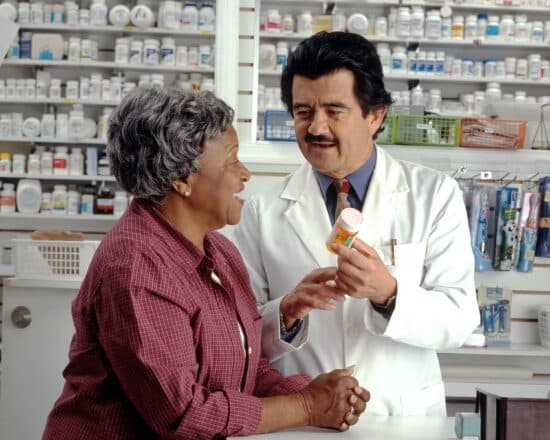Embarking on a journey through the realms of senior healthcare, “Optimizing Medicine Usage: The Role of Pharmacists in Senior Healthcare” acknowledges the complexities faced by elders while managing their medicines. The narrative unfolds the various intricacies of drug interactions, side effects, and the role aging plays in altering one’s response to medicines. It beckons you to be proactive in communicating with healthcare professionals about your medical history and habits for safer medication practices. The guide underlines the importance of pharmacists, whose expertise can help enlighten you on potential side effects, hazardous interactions, and the proper administration of prescribed medicines. It further encourages you to enquire about new prescriptions to ensure you are well-informed about their efficiency, potential bottlenecks, and necessary precautions.
Understanding the Changing Bodily Reactions of Seniors to Medicines
As you age, your body goes through a series of transformations that can alter how it reacts to medications. These intrinsic changes can affect how your body absorbs and metabolizes drugs, leading to different reactions that you may not have experienced in your younger years. This phenomenon emphasizes the importance of adjusting medical treatment plans and doses as you age, ensuring that medicines retain their effectiveness while minimizing potential side effects.
How aging affects reaction to medicines
With age, significant changes occur in the body systems responsible for drug uptake, distribution, metabolism, and excretion. These changes can lead to higher drug concentrations in your bloodstream, making you more susceptible to potent effects and adverse reactions. The kidneys and liver, major organs instrumental in ridding the body of medications, experience functional decline, slowing down the body’s ability to process and clear drugs, again contributing to potential adverse reactions.
The link between aging and increased chances of drug interactions
In addition to altering the body’s drug handling, aging also increases the likelihood of multiple medication use, further elevating the risk of drug interactions. As you age, you may require treatment for multiple health conditions, necessitating the use of multiple drugs. Each additional drug presents a new opportunity for interactions, leading to more unpredictable responses and sometimes undesirable side effects.
Types of Drug Interactions and Their Impact on Seniors
Now that you understand the link between aging and increased drug interactions risk, it’s essential to explore the various types of drug interactions that you may encounter.
Explaining drug-drug interactions
A drug-drug interaction occurs when one medication affects the way another works, either boosting or reducing its effectiveness. For seniors on multiple medications, the risk of experiencing drug-drug interactions is significantly high, underscoring the need for careful medication management.
Understanding drug-condition interactions
A drug-condition interaction transpires when a medical condition you have makes specific drugs potentially harmful. Aging often brings about various chronic conditions that can interact negatively with medications, making treatment strategies a delicate balancing act that requires a keen eye from healthcare providers.
Concern about drug-food interactions
What you eat and drink can affect how your medications work. Some foods can interact with drugs, either by blocking absorption in your stomach or increasing your body’s ability to metabolize certain drugs leading to lower effectiveness. Being aware of potential drug-food interactions can help prevent unnecessary side effects or reduced drug efficiency.
Significance of drug-alcohol interactions
Alcohol can also interact negatively with a variety of medications, altering their effectiveness or causing adverse reactions. Given the higher propensity for drug use among seniors, the importance of understanding the potential risks of mixing alcohol and drugs should not be underestimated.

Side Effects of Medicines in Older Adults
One significant aspect of medication use amongst older adults is the side effects involved. As your body changes, so does its reaction to drugs. This often leads to higher incidence of side effects, ranging from mild ones like dry mouth or dizziness to more severe ones such as kidney damage or bleeding.
Range of side effects
The number and diversity of side effects that come with medication use in older adults vary, largely dependent on the types of drugs consumed. Common side effects might include anything from nausea and fatigue to more serious ones such as heart palpitations and confusion.
The necessity to track and report side effects
It’s critical that you track these side effects and report them to your healthcare provider promptly. Doing so helps your doctor have good visibility on your treatment progress and adjust doses or change medications if necessary.
Grasping serious and minor issues
It’s also crucial that you understand the difference between minor side effects, which often resolve without intervention, and more serious ones that necessitate immediate medical attention. Your healthcare provider can help you identify which side effects to watch out for each medication.
Importance of Regular Communication with Healthcare Professionals
Maintaining regular communication with your healthcare professionals is key to successful medication management. These conversations should incorporate your medical history, any issues with medicine administration, and your current dietary habits.
Role of medical history in medicine management
Your medical history gives your healthcare provider a comprehensive view of your health, including any chronic conditions or previous adverse drug reactions, which can influence drug choice and dosage recommendations.
Influence of eating habits on drug effectiveness
Your eating habits can also affect how your body processes drugs and might require adjusting drug schedules. For example, some drugs should be taken on an empty stomach for better absorption, while others should be taken with food to reduce stomach upset.
Dealing with difficulty in medicine administration
Finally, communicating any difficulties dealing with medicine administration can help your healthcare provider come up with solutions that make taking medications less daunting. This could mean shifting to once-daily dosing regimens or using easy-to-swallow liquid formulations.
The Importance of Providing Complete Medicine Information
Providing complete and accurate medication information to your healthcare provider is another fundamental aspect of safe and effective medication use.
Avoidance of harmful interactions
If your healthcare provider has a complete list of your medications, they can better identify potential harmful interactions and adjust your treatment plan accordingly.
Ensuring medicine efficacy
Disclosing all medication details also assists in ascertaining the effectiveness of the drugs you’re currently taking. If some drugs aren’t working as well as they should, your healthcare provider can explore why that could be happening and come up with necessary amendments to your treatment plan.
Role of seniors in providing accurate information
As a senior, your role entails ensuring that your healthcare provider has the most up-to-date and complete medication information. This includes over-the-counter medications, herbal supplements or vitamins you might be taking in addition to your prescribed drugs.
Role of Pharmacists in Medicine Understanding
Pharmacists play a crucial role in helping you understand your medications, their usage, potential side effects, how to prevent harmful interactions, and they can provide you with written information for better comprehension.
Assistance in understanding usage
Pharmacists are trained experts in medication usage. They can guide you on when and how to take your medications to maximize benefits and minimize adverse effects.
Guide in acknowledging potential side effects
Pharmacists can alert you to potential side effects that you should look for when starting new medication. They can also reassure you about common side effects and advise when to seek medical help for more serious adverse reactions.
Prevention of harmful interactions
Your pharmacist is also a reliable resource for preventing potentially harmful drug interactions. They have the tools and knowledge to spot possible interactions and can send recommendations for changes to your doctor.
Provision of labels and written information
Pharmacists provide easy-to-read labels and additional written information on drug usage that you can refer to at home. These materials can serve as a useful reference and reminder of when and how to take your medications properly.

Positive Impacts of Asking the Appropriate Questions to Doctors and Pharmacists
Initiating conversations with your healthcare providers about any concerns or doubts you may have about your medications can provide several benefits.
Clarification of medicine administration
Your doctor and pharmacist can clarify any confusion you may have about taking your medications. They can guide you on the proper timings, dosage, and methods of administration, ensuring you make the most out of your treatments.
Understanding of medicine effectiveness
They can also help expand your understanding of how your medications work. Knowing how a drug is supposed to work can make it easier for you to recognize if it’s working well or if adjustments need to be made.
Identification of potential challenges
These conversations can help identify potential obstacles to medication adherence, such as side effects or cost issues, and stimulate problem-solving to overcome these challenges.
Knowing the precautions in taking medicines
Lastly, your healthcare provider can provide you with necessary precautions to consider when taking your medications. This will help you avoid potentially harmful drug interactions and side effects.
Overlooked Role of Pharmacists in Senior Healthcare
While much emphasis is placed on the role of doctors in healthcare, it’s important to highlight the often overlooked yet significant contribution of pharmacists, particularly in seniors’ healthcare.
Bridging gaps in prescription information
Pharmacists act as the final checkpoint in the medication process. They can fill in gaps in prescription information, ensuring that you understand your medication treatment plan and how to use your medications safely and effectively.
Pharmacists as facilitators in patient education
Furthermore, pharmacists are excellent educators. They can explain drug-related information in ways that are easy for you to understand, raising your awareness about potential drug interactions and side effects.
Raising awareness on potential drug interactions
Pharmacists also raise awareness on potential drug interactions that can occur between prescribed medications, over-the-counter drugs, and herbal supplements. This is crucial for preventing unwanted side effects and ensures that you get the intended benefits from your medications.
Practices for Safe and Effective Medicine Usage for Older Adults
Adopting certain safe practices can further enhance the safe and effective use of medications among older adults.
Proper medication storage
Proper storage of medications is essential to maintain their effectiveness. Store your medicines in a cool, dry place away from heat and light unless otherwise mentioned.
Following prescription labels accurately
Make sure to follow the instructions on prescription labels accurately. Deviating from these guidelines could lead to reduced effectiveness or increased risk of side effects.
Benefits of medication reminders
Setting up medication reminders can help you remember to take your medications on time, increasing adherence, and ensuring maximum benefit from your treatments.
Preventing Medication Errors Among Seniors
By following the above recommendations and practices, you can contribute significantly towards preventing medication errors.
Role of pharmacists in minimizing errors
Pharmacists can help minimize medication errors by thoroughly reviewing your medication plan for potential mistakes and offering recommendations for adjustments if necessary.
Importance of regular medication reviews
Regularly reviewing your medication regimen with your healthcare provider can identify ineffective medications or instances where medications may be causing more harm than good.
Significance of educating seniors on correct usage
Finally, education is critical in preventing medication errors. As an older adult, being educated on the correct usage, potential side effects, and precautions associated with your medications is the first step towards safe and effective medication use.
This guide lays out comprehensive information to older adults about the use of medicines, potential risks, and ways to ensure safe and effective usage. By understanding how aging affects your use of medications and engaging actively with your healthcare professionals, you can continue to benefit from medication treatments while mitigating their associated risks.

